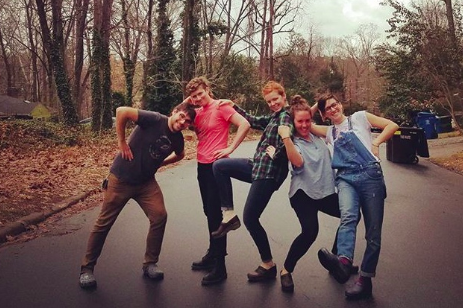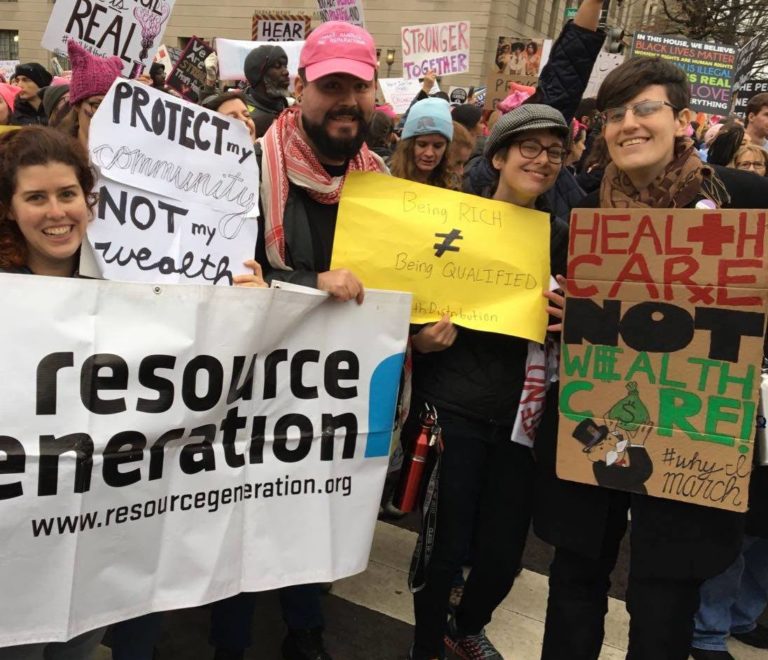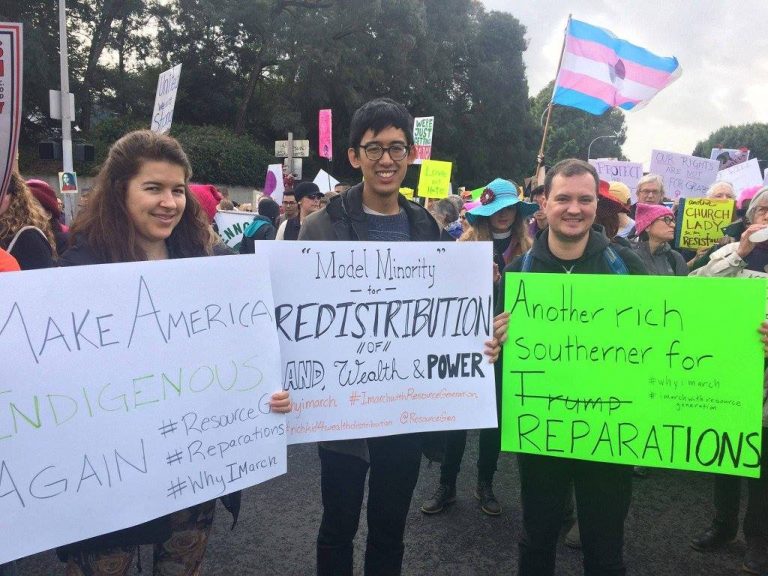Triangle NC RG’s Campaign to Protect Durham Housing!
We are writing to share about Triangle North Carolina RG chapter’s first public-facing campaign, which we called “Protect Durham Housing.” (Spoiler alert: it was a success, and we raised over $120k through grassroots efforts!).
[A little background on our chapter: we are relatively small compared to other chapters around the country, but devoted!; there are a core of 7-9 people that regularly come to meetings, and a few more who have other priorities yet are committed to doing RG-related work in our community.]
First off, we wanted to share our goals for the grassroots campaign we undertook. Then we’ll walk through the process, outcomes, challenges, and lessons we learned. You can decide if we achieved all that we set out to do…

What were our goals anyhow?
- Support Durham Community Land Trustee‘s work
- An amazing, POC-led organization that provides and protects housing for vulnerable communities here in Durham, acting in direct opposition to capitalist housing and developer-based markets.
- Combat gentrification and support affordable housing and community land ownership in a fitting way for class privileged/wealthy people.
- Practice being fundraisers!
- As class-privileged people, we have access to money and also to immense networks of other privileged people. We aimed to leverage that for social justice work locally. We leaned into discomfort, approached our families and friends, learned to strategize (20/80 rule – that 80% of your fundraising goal will come from 20% of the folks you reach out to, looking through your phone contacts, etc.), learned to make pitches and follow up, etc.
- GO PUBLIC
- Little by little, our chapter has been becoming more public, and this was a way to take it one step further.
- Engage more class-privileged folks in the Triangle area (Durham, Raleigh, and Chapel Hill, North Carolina).
- Get comfortable with campaign work
- We aim not just to talk and learn together, but to ACT. This is the first time our chapter has been part of a larger scale action that we co-created!
- Build deeper relationships with the social justice organizations in our community – Keep building trust! Keep showing up! Keep aiming higher!
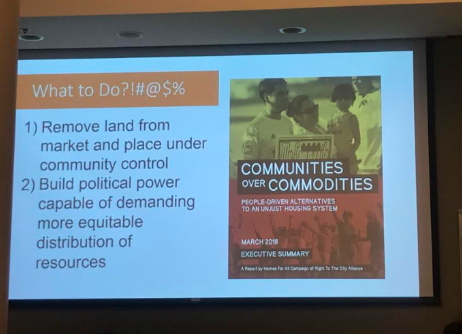
How did this grassroots campaign come together?
The first seed for the Protect Durham Housing campaign came out of a talk that Yahya, our dear, fierce national liaison led at a chapter meeting in the summer of 2017 following our request to talk about “the state of gentrification in Durham, how we/class privileged folks in general fit into that picture, and what solidarity actually means and looks like for class-privileged folks.” This meeting was advertised via our listserv and word of mouth, and drew in about 15 people. For the discussion, Yahya used slides that Mel Norton, a bad-ass local historian and political educator, developed for her work at BullCity150–a project that uses the interdisciplinary tools of history, geography, public policy, and documentary research to illuminate the origins of race and class disparities in Durham.
Fast forward a few months to late fall 2017, when the chapter was approached about the possibility of Triangle NC RG supporting the work of Durham Community Land Trustees (DCLT) by the same aforementioned historian Mel Norton and Kristen Cox, an RG alum and Development and Communications Manager for DCLT. Mel taught us about the land trust model that DCLT has been using for the past 30 years to create permanently affordable housing in Durham.*
Importantly, Mel challenged everyone to consider their personal motivations for supporting this work. One of our chapter leaders, Lars, speaks to theirs: “As someone who has directly participated in gentrification in Durham through buying and selling a home in one of the gentrified neighborhoods, I had been grappling with the question of how to redistribute the money I’d made during the sale. I couldn’t go back on the sale, which occurred in 2015, but looking to the future I have learned that I don’t have to fall into the “whatever the market will bear” capitalistic mantra that has greatly contributed to our current housing crisis…So, partnering with DCLT, an organization led by a black woman from Durham, whose residents are 92% people of color, that has a long track record of actively working to create permanently affordable housing for folks was the perfect match for our first public-facing campaign. The palpable energy in our chapter was also another real reason we chose to move forward with this campaign!”
Mel and Cox gave us a few options for supporting DCLT; as a group, we felt most excited about sharpening our organizing skills to raise money for a housing organizer position. Unlike larger cities around the country, Durham doesn’t have full-time paid positions for housing organizers and doesn’t have a tenants union–which means that the capacity to strategize and build political power has been limited. We felt energized to raise money for a position that will provide tenant education and leadership development, connect residents-in-need with social services, liaise with partner organizations and groups working on housing justice around Durham and NC.
Initially, DCLT asked for $50,000 to fund one year of the position. However, the group felt that we could aim higher, and decided to set a goal of $100,000 to secure the salary and benefits for at least two years.
With a core group of six RG members, we organized a campaign launch at the end of February, which had a large turnout (nearly 50 people!), clearly demonstrating how thirsty people are for this type of anti-displacement aka gentrification work. For the launch, we decided to begin with the political education that had first led us to this point of engagement and excitement, so again asked Mel to share some of her local housing history knowledge for the broader community. We also learned about the eviction crisis in Durham County from a local Legal Aid lawyer — with about 900 evictions every month it is among the highest in the state — and folks from RG and DCLT talked about why this work and position was important to them.
And then, we got down to the nitty-gritty of fundraising. We presented folks at the campaign launch with options to donate and challenged them to consider what a meaningful donation would mean to them personally. There were also opportunities presented to plug in in other ways: to organize more political education and to learn how to fundraise friends and family. These opportunities broadened the scope of our campaign and really pushed folks to learn essential grassroots fundraising skills. Several folks eventually organized others in their networks and families, which led to some large donations that really pushed the campaign over the edge!
Several of us also attended and became involved with the Triangle Standing Up for Racial Justice’s (TSURJ) Middle and Owning-Class Caucus to base-build and spread the word of our campaign. Folks interested in the political education aspect organized a community workshop entitled “Housing is a Human Right” and plugged into other ongoing efforts in the city.

The campaign deadline was set for May 31st, and after unending chains of emails, spiralling meeting fatigue, and of course, numerous awkward fundraising conversations… (*drumroll please*…) we hit our goal of 100k… and then exceeded it, with a total of about 60 people contributing and donating in a range from $10-$15k. In other words, we raised enough money for Durham Community Land Trust (DCLT) to hire a Housing Organizer for two years!!! #ProtectDurhamHousing
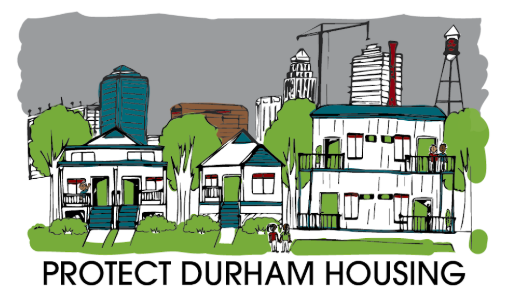
Other wins include a large number of base-building opportunities, deepening and initiating relationships with partner organizations, growing our organizing skills, and getting to put the RG mission into action to show our community what we’re about. A somewhat subtle, yet powerful aspect of this campaign is that it demonstrates, both internally and externally, what the chapter is capable of achieving as we move forward in deciding our next steps. We hit our goals, and they are goals that demand to be returned to over and over again in our commitment to collective liberation and an end to racialized capitalism.
What were our main challenges?
- Leadership exhaustion and capacity
- While the campaign was a huge success, it demanded a lot of attention and we didn’t have time for other important aspects of chapter work; particularly chapter meetings, one-on-ones, and more of the internal, processing work was put on a back burner.
- Messaging hurdles
- How DCLT functions has a number of technical aspects that are unfamiliar to most people and can be difficult to explain, so we really needed to educate ourselves and our community on why the land trust is a unique and effective model. Also, why an organizer position is vital to the work of DCLT.
Important lessons we learned:
- Strong community partners are key.
- We were extremely fortunate to have community partners willing to attend multiple meetings in order to educate us and our public. Mel Norton presented, facilitated, and participated in conversations at several meetings within the chapter, at the campaign launch, and at the workshop. Kristen updated our outreach spreadsheet, printed acknowledgement letters, and gave us fundraising updates from time to time.
- Kristen aka ‘Cox,’ as an RG alumna, knew what the chapter could do if we set our minds to it, and presented us with the opportunity for this campaign. She says, “Since coming up through RG as an alumna and wishing to marry all I have learned in 20 years aiming to work for social justice, not only to give money, but also to work for and with POC-led organizations making the most impact, I saw an opportunity to approach the Triangle Chapter to get creative with how the Land Trust could raise money in a sector dominated by bank financing and federal and municipal funds that are only dwindling. This is the case for cities, communities all across the country being ravaged by gentrification. The Community Land Trust model presents an opening, an opportunity for other chapters to partner to protect our affordable housing stock.”
- Aim high! And then higher!
- Really leaning into asking folks to think about what a meaningful donation is to them based off what a meaningful donation meant to each of us on an individual level was how we crafted our fundraising asks. This was a helpful challenge, especially to a lot of folks who’d never been asked to think about this prompt in relation to giving. It led to lots of great conversations and higher donations than we would have directly asked folks for.
- Organizing is literal
- A working google document to track progress was helpful for remembering all we’ve been doing (meeting agendas, crafting emails, goals, etc.)
We are taking a little break now after reaching the end of this successful campaign; we’re planning to hold a celebration and begin to strategically assess our next steps at meetings planned for the next few months.
[*The very basic breakdown on how DCLT is able to create long-term affordable housing is by retaining ownership of the land their homes are on and placing it under community-control. This effectively removes the land from the for-profit housing market, instead treating it as a community resource; it ensures that homeowners are still able to build equity, but a percentage of the wealth created is shared back with the community and the next low-income buyer in need of housing. DCLT also rents a large number of units that are similarly affordably priced and community-governed. You can check out their website to learn more–it is excellent. RG leader, Maggie Heraty designed the button graphics too!]
—
This blog post is by the Triangle, North Carolina RG chapter-members. Learn more about RG chapters here.
Resource Generation is the only organization in the U.S. organizing young people with wealth toward the equitable distribution of wealth, land, and power. As a result of becoming a member of Resource Generation, our members end up giving away 16-times more money to economic and racial justice organizations than they did before. Learn more and support our work by becoming a member here.
If you need help figuring out your class background, check out our definition of wealth and/or fill out this intake form to have one our national organizers reach out to you.
